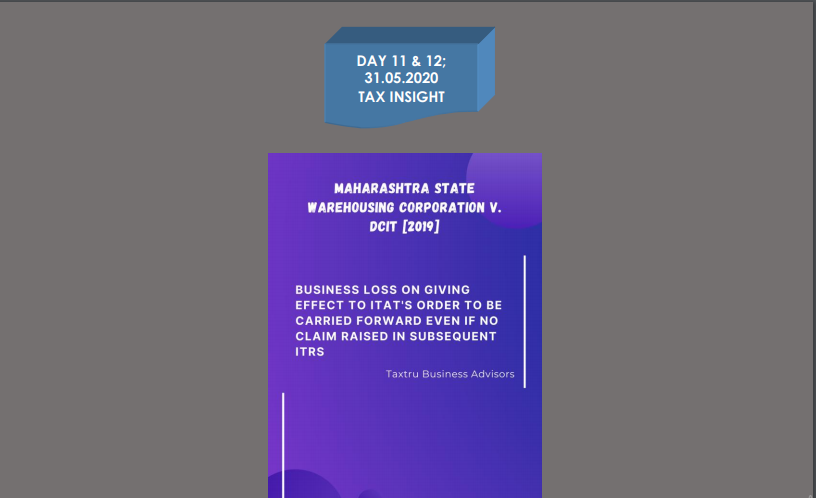Maharashtra State Warehousing Corporation Versus DCIT & ITR Changes
- Maharashtra State Warehousing Corporation Versus DCIT
- TOPIC A: – MAHARASHTRA STATE WAREHOUSING CORPORATION VS. DCIT ITA NOS.: 2366 TO 2399/PUNE/2017
- TOPIC-B; The Central Board of Direct Taxes (CBDT) on Friday amended the return forms and manner of furnishing return of Income for the Assessment Year 2020-21.
- Read the copy:
Maharashtra State Warehousing Corporation Versus DCIT
Business loss on giving effect to ITAT’s order to be carried forward even if no claim raised in subsequent ITRs.
TOPIC A: – MAHARASHTRA STATE WAREHOUSING CORPORATION VS. DCIT ITA NOS.: 2366 TO 2399/PUNE/2017
| 1. |
Hon’ble Supreme Court, in the case of Sudershan Auto and General Finance Vs CIT 60 ITD 177 …it must be remembered that there is no presumption that everyone is presumed to know the law. It is often said that everyone is presumed to know the law, but that is not a correct statement; there is no such maxim known to law” |
| 2. | Till now, almost 32 erstwhile Members/Vice Presidents and Presidents of ITAT have been elevated to various High Courts including two to the Supreme Court. Often, it has been seen that the orders cited by tribunals are flawlessly cited. |
| 3. |
We are going to discuss a very important case pronounced by Pune Tribunal citing that:- Where business loss was arrived at by Assessing Officer while giving effect to order of Tribunal, said the loss could be carried forward and benefit of set-off against business income in subsequent assessment years could be allowed to assessee even in absence of such claim in return of income |
| 4. |
BRIEF FACTS OF THE CASE:- (READ CAREFULLY)
|
| 5. |
SUBMISSIONS OF ASSESSEE
a) the Assessing Officer passed the order dated 11-11-2014 giving effect to the order of Tribunal in ITA No. 1140/PUN/2012 dated 25-08-2014 setting aside the revision order passed under Section. 263 of the Act. b) Thus, the assessment for the assessment year 2002-03 attained finality after the aforesaid order of Tribunal. c) Till that time the assessee was not clear about the status of business loss determined by the Assessing Officer for the assessment year, 2002-03 vide order dated 14-12-2009 passed under Section 143(3) read with Section 254 of the Act. d) Moreover, by the time the Assessing Officer passed the aforesaid order for the assessment year 2002-03, the assessee had already filed its return of income for the assessment years under appeal (i.e. assessment years 2003- 04 to 2006-07). e) Hence, there was no occasion for the assessee to claim set-off of brought forward losses in the return of income. f) The AR further submitted that the provisions of section 153(3) clearly states that the time limit as set out in subsection (1) and sub-section (2) for the completion of the assessment, reassessment, and recomputation would not apply where the fresh assessment is made in pursuance to the order under Section. 254 or section 263 or section 264 of the Act. g) The ld. AR further contended that the provisions of section 71 merely states that where the assessee in the computation of income under any head of income other than capital gain has a loss and the assessee has no income under the head capital gains he shall subject to the provisions of Chapter VI be entitled to set off of a loss against his income if any assessable for that assessment year under any other head. h) In section 72 it is provided that the assessee shall be eligible for claiming set off of carried forward losses other than speculation losses from the income. i) It is not the requirement of section 71 or 72 that the losses must be claimed in the return of income. j) The ld. AR further argued that in the original return of income for the assessment year 2002-03 the assessee had declared total income as ‘Nil’. Thus, there was no question of claiming a set-off of loss in subsequent assessment years. k) The issue of carried forward of business loss emanated from computation of loss by the Assessing Officer in consequence to the order of Tribunal. l) At the time of filing return of income for the subsequent assessment years i.e. assessment years 2003-04 to 2006-07, it was not within the knowledge of assessee about business loss determined by the Assessing Officer in the assessment year 2002-03. Hence, the same was not claimed in the return of income. SUBMISSIONS OF DR
|
| 6. |
FINDINGS OF THE TRIBUNAL As per the factual matrix of the case has already been explained, The solitary issue that emerges for adjudication in this appeal is; A) Whether the business loss arrived at by the Assessing Officer while giving effect to the order of Tribunal can be carried forward and benefit of set-off against the business income in the subsequent assessment years can be allowed to assessee in the absence of such claim in the return of income? B) It is an undisputed position that the assessee in the return of income for the assessment years 2003-04 to 2006-07 has not claimed set-off of brought forward business loss. C) The loss determined by the Assessing Officer in the assessment year 2002-03 is consequent to the directions of Tribunal in an appeal by the assessee for the assessment year 2002-03. D) The Assessing Officer passed the order under Section. 143(3) read with Section 254 on 14-12-2009 computing business loss of Rs.13,00,25,239/- eligible to be carried forward. E) By the time the assessee had already filed return of income for the impugned assessment years and hence the assessee had no occasion to claim set-off of brought forward a business loss from the assessment year 2002-03 in the return of income. It is a clear case of supervening impossibility. F) Here it would be relevant to refer to the provisions of section 153 of the Act. The provisions of section 153 lay down the time limit for completion of the assessment, reassessment, and recomputation. G) The sub-section (1) sets the time limit for completing the assessment under Section. 143/144. Subsection (2) specifies the time limit for completion of assessment under Section. 147. H) The provisions of sub-section (3) of section 153 deals with the situation where fresh assessments are made in pursuance to the orders by revisional/appellate authorities. I) The provisions of sub-section (3) as they were applicable to the assessment year under appeal are reproduced herein below: “(3) The provisions of sub-sections (1), (1A), (1B) and (2) shall not apply to the following classes of assessments, reassessments, and recomputations which may, subject to the provisions of sub-section (2A), be completed at any time— (i)** ** ** (ii) where the assessment, reassessment or recomputation is made on the assessee or any person in consequence of or to give effect to any finding or direction contained in an order under section 250, 254, 260, 262, 263, or 264 [or in an order of any court in a proceeding otherwise than by way of appeal or reference under this Act ; (iii) Where, in the case of a firm, an assessment is made on a partner of the firm in consequence of an assessment made on the firm under section 147.” Thus, the time limit specified in sub-section (1) and sub-section (2) to section 153 does not apply to the orders passed for giving effect to the order of revisional/appellate authorities. J) Whereas a consequence to the order of Appellate Authority, the assessee has received relief which has the cascading effect on subsequent assessment years, the Assessing Officer is duty-bound to give effect to the said order in the later affected assessment. K) We do not find merit in the observations of Commissioner of Income Tax (Appeals) that in the absence of a claim of set-off of brought forward business loss in the return of income the same cannot be allowed to the assessee. L) The Commissioner of Income Tax (Appeals) while making such observations has failed to consider the fact that the assessee in its return of income had declared Nil income, the business loss determined by the Assessing Officer was consequent to the order passed while giving effect to the order of Tribunal. M) Be that as it may since the assessee has raised the claim before the appellate authority, the same should have been considered by Commissioner of Income Tax (Appeals) instead of rejecting the same at the threshold. N) The Hon’ble Bombay High Court in the case of CIT v. Pruthvi Brokers & Shareholders (P.) Ltd. [2012] has held the assessee is entitled to raise additional grounds not merely in terms of legal submissions but also additional claims to wit claims not made in the return filed by it. O) Thus, in view of the facts of the case and the provisions of the Act, we hold that the assessee is eligible for claiming the benefit of set-off of brought forward business loss in the impugned assessment years. |
| 7. |
ITA NOS. 2397 TO 2399/PUN/2017 (A.YS. 2004-05 TO 2006-07) FINAL VIEW OF ITAT Both sides are unanimous in stating that the facts and the grounds of appeal raised in ITA Nos. 2397 to 2399/PUN/2017 are identical to the grounds raised in ITA No. 2396/PUN/2017. Thus, in view of the fact that the issue in all the appeals is identical and is arising from the same set of facts the findings given by us while adjudicating the appeal in ITA No. 2396/PUN/2017 would mutatis mutandis apply to the appeals in ITA Nos. 2397 to 2399/PUN/2017, as well. Accordingly, the appeals of the assessee are allowed in the same terms. |
TOPIC-B; The Central Board of Direct Taxes (CBDT) on Friday amended the return forms and manner of furnishing return of Income for the Assessment Year 2020-21.
| 1. |
|
| 2. |
Individuals being a resident (other than not ordinarily resident) having total income up to Rs.50 lakh, having Income from Salaries, one house property, other sources (Interest, etc.), and agricultural income up to Rs.5 thousand and Not for an individual who is either Director in a company or has invested in unlisted equity shares.
It is for Individuals and HUFs not having income from profits and gains of business or profession.
It is for individuals and HUFs having income from profits and gains of business or profession.
Sugam is for individuals, HUFs and Firms (other than LLP) being a resident having total income up to Rs.50 lakh and having income from business and profession which is computed under section 44AD, 44ADA or 44AE and not for an individual who is either Director in a company or has invested in unlisted equity shares.
It is for persons other than an individual, HUF, company, and the person filing Form ITR-7.
It is For Companies other than companies claiming exemption under section
It is for persons including companies required to furnish return under Sections 139(4A) or 139(4B) or 139(4C) or 139(4D) only. |
| 3. |
CHANGES IN ITR FORMS FOR FY 2019-20 OR AY 2020-21:- A) If you have taxable income as dividends from domestic companies, you are not eligible to file the ITR-1 form. B) Those with joint ownership of house property cannot file ITR-1 or ITR-4. C) Taxpayers need to answer the following questions all the ITR forms:
|
Read the copy:
If you already have a premium membership, Sign In.














